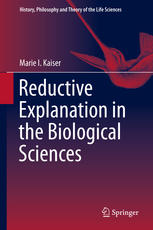

Most ebook files are in PDF format, so you can easily read them using various software such as Foxit Reader or directly on the Google Chrome browser.
Some ebook files are released by publishers in other formats such as .awz, .mobi, .epub, .fb2, etc. You may need to install specific software to read these formats on mobile/PC, such as Calibre.
Please read the tutorial at this link: https://ebookbell.com/faq
We offer FREE conversion to the popular formats you request; however, this may take some time. Therefore, right after payment, please email us, and we will try to provide the service as quickly as possible.
For some exceptional file formats or broken links (if any), please refrain from opening any disputes. Instead, email us first, and we will try to assist within a maximum of 6 hours.
EbookBell Team

4.1
80 reviewsThis book develops a philosophical account that reveals the major characteristics that make an explanation in the life sciences reductive and distinguish them from non-reductive explanations. Understanding what reductive explanations are enables one to assess the conditions under which reductive explanations are adequate and thus enhances debates about explanatory reductionism. The account of reductive explanation presented in this book has three major characteristics. First, it emerges from a critical reconstruction of the explanatory practice of the life sciences itself. Second, the account is monistic since it specifies one set of criteria that apply to explanations in the life sciences in general. Finally, the account is ontic in that it traces the reductivity of an explanation back to certain relations that exist between objects in the world (such as part-whole relations and level relations), rather than to the logical relations between sentences. Beginning with a disclosure of the meta-philosophical assumptions that underlie the author’s analysis of reductive explanation, the book leads into the debate about reduction(ism) in the philosophy of biology and continues with a discussion on the two perspectives on explanatory reduction that have been proposed in the philosophy of biology so far. The author scrutinizes how the issue of reduction becomes entangled with explanation and analyzes two concepts, the concept of a biological part and the concept of a level of organization. The results of these five chapters constitute the ground on which the author bases her final chapter, developing her ontic account of reductive explanation.